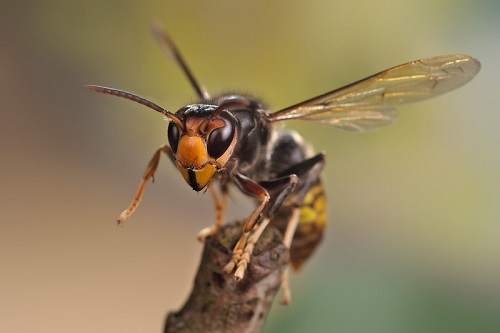Murder Hornets Invade Britain
August 21, 2020
Uh oh...
There could be a very big problem sweeping across the UK very soon, and no, we are not talking about COVID-19. New reports are blowing up at that murder hornets have been spotted in the UK. Experts are already hitting the panic button about it, according to a recent report in the New York Post.
The Asian Giant Hornet is unlike anything else we have seen in terms of size and its destructive capabilities. If you have never seen a video of how they operate, do yourself a favor and spend some time on YouTube this week checking it out. They hover outside honey bee hives, waiting for bees to return, then pick them off one at a time, literally ripping their heads off, until they have decimated the hive. Once the hive is defenseless, the hornets enter the hive and take the bounty.
Now that these hornets have been spotted in Devon, local environmentalists are extremely worried that the hornet could set down roots and start to work its way across the country, destroying honey bee hives in its wake. Gerry Stuart, a rep for the Asian Hornet Action Teams in Torbay, stated, “This is a threat to all pollinators, not just honey bees. Unlike our native European hornet (Vespa crabro), it doesn’t fly at night. Thwarting its establishment here in the UK is crucial to protect our pollinators, UK flora, fruit and other insect-pollinated crop production.”
Due to the nature of the stings from these hornets, there is now also some concern about people stumbling into a hornet’s nest accidentally and paying the price. Recent reports by people that have been stung by these hornets describe it is a "searing pain.” Now, for the record, these hornets are usually not overly aggressively around people, but that all changes when they are disturbed. Stuart stated, “The public should be aware that whilst the Asian hornets are not ordinarily aggressive, they are advised that they should not under any circumstances approach a nest. If they are disturbed, they will actively defend their nests.”
Another local beekeeper also warned against accidentally disturbing these nests because while they are generally up higher, beekeepers are finding these nests at ground level as well as in shrubbery. Colin Lodge, a local beekeeper and founder of the first AHAT team in the UK, stated, “Generally nests are found high in trees but they are now starting to be found low down in garden shrubs, undergrowth, and roadside banks. Bee Inspectors found one in a shrub outside a dining room window of a house. Blundering into such nests in these sorts of places without protection has led to a number of fatalities on the continent from adverse reactions to the insect’s venom from multiple stings. The Asian Hornet could decimate our local native pollinator populations, we are asking everyone, to learn how to identify this non-native species from the other flying insects we usually see at this time of year.”
Source: New York Post


.jpg)



